UN Representatives Praise Iraq's Progress
UK, US, and French UN reps praise Iraq's progress in stability, citing successful elections as a milestone amid corruption challenges, as Iraqi government intensifies service delivery efforts.

The UK, US, and French representatives to the United Nations have praised Iraq's progress towards stability and economic development at the 2024 UN Security Council Briefing on Iraq meeting.
UK and US officials commended Iraq's successful holding of provincial elections in December 2023, the first local election in a decade. The Iraqi Government had long planned for the elections, working with several partners to ensure their smooth running, with the Head of the United Nations Assistance Mission for Iraq, Jeanine Hennis-Plasschaert, commenting that their success 'marked another milestone in the government's efforts to break from past cycles of dysfunction.
Although the country still faces major systematic obstacles, including an entrenched culture of corruption, the current government has doubled its commitment to tackling the seemingly impossible task of delivering services and uprooting bribery for the benefit of the 43.5 million who call Iraq their home.
Fergus Eckersley, the FCDO and UK Political Coordinator, together with the French delegation represented by Nathalie Broadhurst, further commended Al-Sudani's focus on service delivery during the meeting, with Eckersley praising Prime Minister Sudani's 'focus on the delivery of services that the people of Iraq need.
Service delivery has been one of the Prime Minister's key priorities, reversing decades of underinvestment due to conflict and instability, which left the country ill-equipped to deal with its resurgence and rapid population growth.
Following the defeat of ISIS, Iraqi leaders were faced with the monumental task of completing a large number of infrastructure projects to bring about economic stability. Unfortunately, an entrenched system of corruption resulted in a lack of foreign investment in projects, leaving many incomplete, which the current government is now reversing.
According to the Carnegie Endowment, Iraq's new government has overseen a record level of policy achievements ranging from infrastructure projects to energy independence initiatives and successfully securing a three-year budget from Parliament.
Al-Sudani has taken a hands-on approach to overseeing infrastructure and services projects through regular site visits and establishing the Government Service Team to ensure effective delivery.
Such an approach has enabled the successful completion of significant projects, including re-opening the Baghdad-Fallujah train route following a three-year service pause during the COVID-19 pandemic.
The recent revival of stalled projects such as the Baghdad Metro and the relaunching of the railway project connecting Basra in Iraq and Shalamcheh demonstrates the current government's commitment to service delivery nationwide.
Iraq is also securing investments from regional and international partners for its ambitious $17 billion Development Road Project that aims to connect Al-Faw Port to Turkey via roads, railway networks, and ports.
The project is expected to create over 100,000 jobs and record annual profits of approximately $4 billion. Once completed, it will reduce travel time between Asia and Europe and become another vital link in the global supply chain system.
During the meeting, Plasschaert pointed to such developments as being a 'real opportunity accelerator' and discussed the importance of new ambitious housing and education projects.
The Prime Minister is working with international partners, including China and Korea, to secure funding for affordable housing projects in Baghdad, Basra, Dhi Qar, Maysan, and Anbar. Chinese firms have also been contracted to build new schools across Iraq.
Another area in which Al-Sudani's Government has received praise from UN officials is its continued focus on tackling corruption.
Since taking power in October 2022, Prime Minister Al-Sudani has demonstrated that he is serious about tackling corruption. His government has introduced sweeping reforms, including establishing a government watchdog, signing a Memorandum of Understanding with UN bodies in the anti-corruption field, and actively collaborating with international organisations such as Interpol to bring corrupt officials to justice.
The UK Political Coordinator has also expressed optimism about Iraq's potential role as a regional stabilizer amidst rising tension in the Middle East. This view has been echoed by Thomas Seiler, the EU ambassador to Iraq, who asserted that 'Iraq can play a much, much bigger role, geographically at the center of Arab and Muslim countries, but also politically'.
Prime Minister Al-Sudani's leadership is being tested as he navigates the landmines of
regional conflict amidst fear of further escalation. UN officials are concerned that the spread of conflict will undo Iraq's hard-fought stability and recent successes. Nonetheless, Iraq has received increasing international support from major allies as it continues to forge its positive path forward.
© Copyright IBTimes 2025. All rights reserved.




















